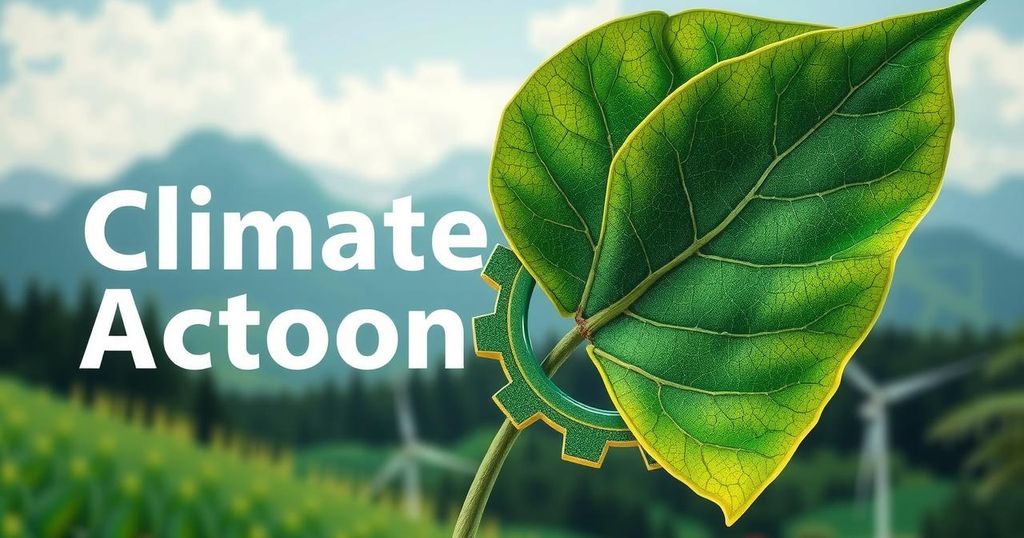The Trump administration has halted most USAID operations, significantly impacting its funding for global humanitarian aid and climate change initiatives. Elon Musk’s actions have raised legal concerns regarding the legitimacy of these measures. Critics warn that this will undermine crucial funding for climate adaptation and disaster resilience in vulnerable nations, complicating commitments under the Paris Agreement.
The Trump administration has effectively suspended the operations of the U.S. Agency for International Development (USAID), a significant action amidst efforts to limit government expenditures without Congressional approval. The restrictions commenced on the first day of Trump’s presidency, following an executive order that halted all USAID funding, impacting various global humanitarian projects and organizations.
Since then, various operations of USAID, including its website and employee access, have been terminated. Elon Musk, now overseeing government efficiency, publicly denounced USAID, calling it a ‘criminal organization’ and advocating for its disbandment. His actions have raised legal questions about the legitimacy of these closures.
Critics of this initiative emphasize that besides affecting health programs, the moves could endanger substantial funds allocated towards climate change mitigation. USAID’s funding was crucial for helping impoverished nations develop renewable energies and adapt to increasing climate-related disasters, among other environmental preservation initiatives. Biden’s administration had expanded these initiatives significantly, aiming for an ambitious reform lasting into the new decade.
While USAID may continue providing emergency aid under the acting director Marco Rubio, significant cuts to its climate-related funding are likely. This would undermine global commitments made under the Paris climate agreement, posing further challenges beyond U.S. borders. Some experts argue that the cuts must be understood in light of the financial commitments already made through Congress.
As the largest donor of foreign aid globally, USAID’s budget—ranging from $40 billion to $60 billion annually—helps countries across Latin America, sub-Saharan Africa, and Southeast Asia with essential services like food security and health care. The future of these initiatives faces uncertainty as projects previously funded are being reassessed amidst USAID’s shutdown.
Innovative initiatives led by USAID, particularly in climate adaptation, are at risk. The agency had sought to reshape its operations to withstand climate impacts over the coming years, such as improving agricultural resilience and infrastructure adaptability. If funding ceases, additional developments will falter, particularly in vulnerable sectors severely impacted by weather changes.
Programs aimed at disaster resilience in countries like Zimbabwe have received crucial support, enabling farmers to better withstand droughts and floods. Minister Washington Zhakata indicated that the cessation of USAID funding would severely hinder Zimbabwe’s ability to honor its Paris Agreement commitments, potentially impeding essential resources allocated for climate adaptation efforts.
Although USAID has faced past criticisms regarding expenditure efficiency and data transparency, its substantial contributions to climate funding mobilize private sector investments. The transitions from public funding to private project investments highlight the potential weaknesses and the overall reliance on government support to address climate issues.
USAID has historically played a pivotal role in international climate financing, aiding regions vulnerable to climate change. The agency’s funding has supported various initiatives designed to bolster renewable energy, disaster resilience, and sustainable practices in low-income countries. Trump’s administration’s efforts to curtail or eliminate this aid reflect broader political shifts that may have consequential impacts on global climate action and development programs.
In summary, the Trump administration’s efforts to dismantle USAID could dramatically curtail vital climate funding, impacting programs that foster sustainability in numerous countries. The potential cessation of support for disaster resilience and renewable energy threatens global commitments to combat climate change, particularly among developing nations. This unfolding situation signifies a broader trend that could have extensive implications for international climate progress and humanitarian initiatives.
Original Source: www.corporateknights.com






